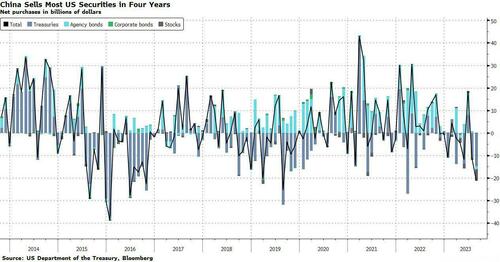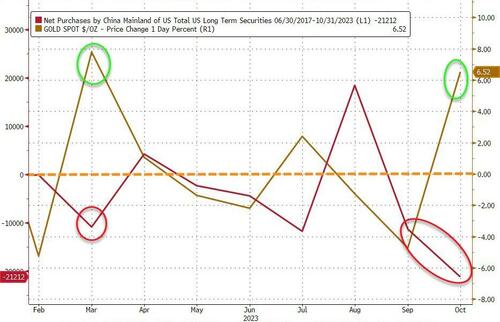
Authored by Michael Maharrey via SchiffGold.com,
Are the Chinese selling US dollar-denominated assets to buy gold?
It sure looks that way.
Chinese investors sold $21.2 billion in US assets in August alone – primarily US Treasury bonds.
[ZH: Note that as the capital outflows soared, the price of gold also soared...]
Meanwhile, the Chinese government has been buying gold at a steady pace.
Writing at FXEmpire, analyst Vladimir Zernov said there are two dynamics driving the Chinese to sell US assets.
The first is an effort to boost the yuan.
China’s currency has struggled against the dollar of late due to softness in the Chinese economy and recently hit multi-year lows. Selling dollar-denominated assets for yuan boosts the local currency at the expense of the dollar. Zernov said, “Selling dollar-denominated assets to provide support to yuan makes perfect sense.”
The second potential reason to sell US dollar-denominated assets is for further de-dollarization. In other words, the Chinese may be trying to minimize their exposure to the US currency for economic and geopolitical reasons.
From an economic standpoint, the Chinese have to be keenly aware of the US government’s budget problem. The US ran a $1.7 trillion deficit in fiscal 2023 and has a national debt north of $33.5 trillion. Why would any country want to be exposed to that kind of risk?
Furthermore, the US has a long history of using the dollar’s position as the reserve currency as a foreign policy hammer. By minimizing dependence on the greenback, countries can blunt America’s ability to control their foreign policy decisions.
This is why many countries are trying to minimize their exposure to the dollar. Confidence in the greenback continues to erode thanks to the profligate borrowing, spending, and money creation by the US government, while America’s use of the dollar as a foreign policy weapon also makes many countries wary of relying solely on dollars.
Zernov said that if China is trying to shift some of its money away from the US-controlled, dollar-dominated global financial system, there aren’t many options other than gold.
Gold is one of the few markets that has sufficient liquidity to absorb billions of dollars of China’s funds.”
The Chinese central bank has been on a gold-buying spree. As of the end of August, the People’s Bank of China had bought gold for 10 straight months and ranked as the largest central bank gold buyer this year. The Chinese central bank has increased its official reserves by 166 tons since the beginning of the year and 217 tons since it resumed official purchases last November. As of the end of August, the People’s Bank of China officially held 2,165 tons of gold, making up 4% of its total reserves.
China has a history of adding to reserves and then going silent.
The People’s Bank of China accumulated 1,448 tons of gold between 2002 and 2019, and then reported nothing for more than two years before resuming reporting last fall.
Many speculate that the Chinese continued to add gold to its holdings off the books during those silent years.
In fact, there has always been speculation that China holds far more gold than it officially reveals. As Jim Rickards pointed out on Mises Daily back in 2015, many people speculate that China keeps several thousand tons of gold “off the books” in a separate entity called the State Administration for Foreign Exchange (SAFE).
Last year, there were large unreported increases in central bank gold holdings. Central banks that often fail to report purchases include China and Russia. Many analysts believe China is the mystery buyer stockpiling gold to minimize exposure to the dollar.
Zernov pointed out that the Chinese tend to move slowly and it remains to be seen if the recent selloff in dollar-denominated assets translates to even more gold demand.
We will see whether the country decided to boost its gold holdings sometime in the first half of the next year. Any signs showing China decided to increase its gold reserves will be bullish for gold and may send its price toward new highs.”
Authored by Michael Maharrey via SchiffGold.com,
Are the Chinese selling US dollar-denominated assets to buy gold?
It sure looks that way.
Chinese investors sold $21.2 billion in US assets in August alone – primarily US Treasury bonds.
[ZH: Note that as the capital outflows soared, the price of gold also soared…]
Meanwhile, the Chinese government has been buying gold at a steady pace.
Writing at FXEmpire, analyst Vladimir Zernov said there are two dynamics driving the Chinese to sell US assets.
The first is an effort to boost the yuan.
China’s currency has struggled against the dollar of late due to softness in the Chinese economy and recently hit multi-year lows. Selling dollar-denominated assets for yuan boosts the local currency at the expense of the dollar. Zernov said, “Selling dollar-denominated assets to provide support to yuan makes perfect sense.”
The second potential reason to sell US dollar-denominated assets is for further de-dollarization. In other words, the Chinese may be trying to minimize their exposure to the US currency for economic and geopolitical reasons.
From an economic standpoint, the Chinese have to be keenly aware of the US government’s budget problem. The US ran a $1.7 trillion deficit in fiscal 2023 and has a national debt north of $33.5 trillion. Why would any country want to be exposed to that kind of risk?
Furthermore, the US has a long history of using the dollar’s position as the reserve currency as a foreign policy hammer. By minimizing dependence on the greenback, countries can blunt America’s ability to control their foreign policy decisions.
This is why many countries are trying to minimize their exposure to the dollar. Confidence in the greenback continues to erode thanks to the profligate borrowing, spending, and money creation by the US government, while America’s use of the dollar as a foreign policy weapon also makes many countries wary of relying solely on dollars.
Zernov said that if China is trying to shift some of its money away from the US-controlled, dollar-dominated global financial system, there aren’t many options other than gold.
Gold is one of the few markets that has sufficient liquidity to absorb billions of dollars of China’s funds.”
The Chinese central bank has been on a gold-buying spree. As of the end of August, the People’s Bank of China had bought gold for 10 straight months and ranked as the largest central bank gold buyer this year. The Chinese central bank has increased its official reserves by 166 tons since the beginning of the year and 217 tons since it resumed official purchases last November. As of the end of August, the People’s Bank of China officially held 2,165 tons of gold, making up 4% of its total reserves.
China has a history of adding to reserves and then going silent.
The People’s Bank of China accumulated 1,448 tons of gold between 2002 and 2019, and then reported nothing for more than two years before resuming reporting last fall.
Many speculate that the Chinese continued to add gold to its holdings off the books during those silent years.
In fact, there has always been speculation that China holds far more gold than it officially reveals. As Jim Rickards pointed out on Mises Daily back in 2015, many people speculate that China keeps several thousand tons of gold “off the books” in a separate entity called the State Administration for Foreign Exchange (SAFE).
Last year, there were large unreported increases in central bank gold holdings. Central banks that often fail to report purchases include China and Russia. Many analysts believe China is the mystery buyer stockpiling gold to minimize exposure to the dollar.
Zernov pointed out that the Chinese tend to move slowly and it remains to be seen if the recent selloff in dollar-denominated assets translates to even more gold demand.
We will see whether the country decided to boost its gold holdings sometime in the first half of the next year. Any signs showing China decided to increase its gold reserves will be bullish for gold and may send its price toward new highs.”
Loading…





